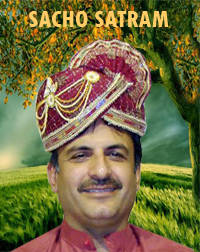In a captivating Satsang emphasizing the significance of Solitude (Ekant), Saijan illuminated the concept that the human mind is akin to a brimful vessel, where there is no room for additional content.
Similarly, the analogy applies to our minds. To attain a mindful pursuit, we must clear our minds by sieving through our thoughts, creating space for new and rejuvenating spiritual wisdom.
Continuous thinking fills our minds entirely, leaving no room for the mindful incorporation of anything new. Full awareness becomes possible only when we create space by quieting the constant stream of thoughts
To carve out space in our minds, free from the incessant flow of unwanted thoughts, it is essential to embrace solitude, known as “Ekant” in our regional language.
In moments of solitude, we engage in introspection, gaining insight into the mental clutter we’ve accumulated. This self-awareness allows us to discern and eliminate unnecessary thoughts. Through the practice of Ekant, fresh ideas emerge, sharpening our minds and enhancing alertness. Consequently, even amidst crowds, we gain the ability to consciously guide our thoughts, choosing what to entertain and what to disregard. Regularly setting aside time for Ekant becomes a valuable and advantageous ritual in nurturing our well-being
When we visit a temple or any place of worship, our intention is often to seek blessings from the deity or God. However, the true benefits of these blessings unfold when we actively engage in understanding the wisdom they impart. To fully grasp and internalise this wisdom, it is crucial to engage in the churning of the mind, aligning our thoughts with the profound insights derived from the blessings we receive.
When we visit a place or settle into meditation to receive blessings, it’s essential to harmonise our mind with the thoughts associated with those blessings. Achieving a reciprocal state of mind is crucial for fully absorbing and embracing the positive influences and insights that blessings bring
Maintaining a focused and clear state of mind, free from unwanted thoughts, is essential to keep it in a reciprocal state. Without this clarity, we risk being unable to fully benefit from the blessings we receive. Our minds need to be receptive and understanding, capable of grasping the wisdom inherent in the knowledge and blessings bestowed upon us, be it in a temple, through a saint, or in any place of wisdom. Without such mental preparedness, our efforts to seek blessings may go in vain.
Hence, it is of utmost importance to set aside regular moments for solitude, allowing us to clear our minds of unwanted clutter. As humans, we have a tendency to speak incessantly, often without filtering our words. This constant chatter results in the accumulation of a considerable amount of mental clutter, clouding our minds with unnecessary thoughts throughout the day
Excessive talking serves as the root cause of many of our worries, stress, anxiety, and agitation
Observing closely, we come to realise that over 90% of our disputes, conflicts, stress, and disagreements with others stem from excessive talking. Our inclination to complain about what others said or what we said keeps us entangled in memories of spoken words. The clear recollection of unacceptable words, both ours and others’, often becomes the catalyst for fights and issues. Consequently, stress accumulates, contributing to various ailments. It’s noteworthy that these conflicts arise more from the language we use with each other than from personal identity or social class. Our tendency to tightly hold onto and dwell on the hurtful words spoken to us further burdens our minds, perpetuating the cycle of suffering.
The presence of ego often hinders our ability to receive and comprehend the wisdom embedded in the blessings we seek at places of worship. Speaking without careful consideration, driven by ego, becomes a significant source of our unhappiness and sadness. Additionally, the habit of talking without thoughtful reflection serves as the root cause of various conflicts and disagreements in our lives.
Indeed, the Mahabharata stands as a profound example of how words can have profound consequences. Draupadi’s insult to Duryodhana, referring to him as the son of a blind man, ignited intense anger within him. Duryodhana harbored that anger over an extended period, eventually leading to a deep-seated desire for revenge. The culmination of this resentment and desire for retribution played a pivotal role in triggering the catastrophic and bloodiest war of the Mahabharata, causing widespread destruction. This narrative underscores the immense power that words can wield in shaping the course of events and the importance of mindful communication.
Sai Sadhram Saheb’s emphasis on the importance of mindful speech is a valuable lesson. To exercise caution in our words and cultivate an understanding of this principle, regular practice of Ekant ( solitude) becomes essential. Engaging in moments of solitude allows us the opportunity to reflect on our thoughts, choose our words wisely, and develop a heightened awareness of the impact our speech can have on ourselves and others.



